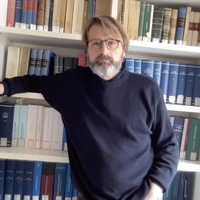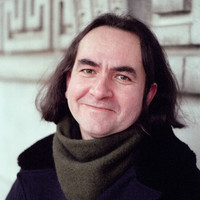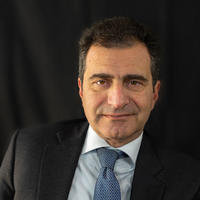Conference Presentations by Ionut Untea
"Il cammino della tolleranza. Tracing the Path of Tolerance. Storia e critica di un concetto poli... more "Il cammino della tolleranza. Tracing the Path of Tolerance. Storia e critica di un concetto politico dall'epoca moderna al dibattito contemporaneo", Convegno Internazionale, Padova, 26-27 Maggio 2015. Programma dettagliato ed ulteriori informazioni al sito: http://tolleranza2015.wordpress.com/
Papers by Ionut Untea

The Journal of Aesthetic Education, Apr 1, 2020
Writing about the ethics and aesthetics of the natural environment, authors like Berleant, Plumwo... more Writing about the ethics and aesthetics of the natural environment, authors like Berleant, Plumwood, Becker, Gschwandtner, Brady, and Scruton share a number of insights with historians of religions (Mauss, Otto, Eliade) over the connection between humanity and nature. These insights are the attention given to human awe in the face of majestic landscapes, a distinctive agency operating through nature’s intentionalities, the sacred character given to this agency of nature, and a feeling of guilt for human destiny diverging from nature’s path or for trespassing the limits humanly imposed that separate the space of artificial human dwelling from natural environment. I argue that reflecting on the awe of the archaic human mind, in the form of both tremendous fear and positive fascination for the mystery of nature, has potential for a contemporary aesthetic and ethical perspective of a symbiotic approach regarding nature’s fate in the context of a human technological destiny.
Dix-septieme Siecle, Sep 9, 2022
Studies in Christian Ethics
Journal of European Studies
In political philosophy, brute or circumstantial luck entails responsibilities. Even so, leaders ... more In political philosophy, brute or circumstantial luck entails responsibilities. Even so, leaders may be tempted to capitalize on lucky endowments or circumstances that turn in their favour without giving too much attention to moral responsibility. This is because besides moral responsibility, there is another kind of responsibility that flows out of luck. Machiavelli and Hobbes provide the classic philosophical accounts of honour-based responsibility and universal moral responsibility. While this distinction is only suggested by Machiavelli, Hobbes explicitly develops an account of the laws of honour and the laws of nature that make the essential difference between a political community and a community where the state of war becomes less visible, although still ongoing.

Ethical Perspectives, 2019
The present paper challenges the view, rooted in the argument that groups lack a mind in the Davi... more The present paper challenges the view, rooted in the argument that groups lack a mind in the Davidsonian sense, that collective responsibility may be assessed mainly according to pragmatic criteria. I argue in favour of a kind of mental web of holistic collective attitudes and mindsets in the weak sense. I further connect this mental web to the dimension of collective responsibility via a reflection involving the existentialist dimension of Jaspers’ dilemma of seeing individuals in the position of having to embrace not only those aspects of the collective identity that make them proud, but also those for which they feel guilt. My argument is also inspired by Sartre’s view of a task reflected in the individual mind by the group as a special kind of subjectivity living ‘for’ and ‘through’ individuals. I illustrate my argument with the 2018 controversies surrounding the approach of Poland’s political leaders to the Polish continuity of collective identity and collective responsibility.

Philosophy East and West, 2022
The intercultural reflection proposed in this article remains relevant for contemporary observati... more The intercultural reflection proposed in this article remains relevant for contemporary observations regarding the unsatisfactory results of the rituallike behaviors promoted at the collective level, with the goal of achieving social harmony and the healing of past wrongs. From this standpoint, the article confirms Robert C. Neville's suggestion that more attention should be given to resemblances between the Confucian theory of ritual and Peirce's semiotic theory. At the same time, by reflecting on self-development, the article points to a deeper level of comparison that would stress the similarities between Peirce's understanding of the connection between the manifestations of the "man-sign" and the three "categories" of reality, and the Confucian approach to human selves as "centers of relationships" deeply dependent upon natural and social contexts.

Semiotica, 2020
The article proposes a reflection on cultural sign production in social contexts dominated by the... more The article proposes a reflection on cultural sign production in social contexts dominated by the socially generalized fear of the unknown other and the obsession for vulnerability avoidance. This phenomenon has been reflected in the generalized tendency of reliance upon contractual trust, where the coherence of the signs legitimating a trustful relationship is maintained by external agencies backed by authoritative forums (e.g., religious, legal, political) and sanctioned by well-defined rewards and punishments. In contrast with the contractual model of trust, I propose a different model, covenantal trust. Taking as a point of departure Levinas’s phenomenological interpretation of the responsible self-opening toward the “sign of the giving of signs” which involves covenantal elements, I advance toward proposing a more active involvement of the participants in the process of joint production of signs. This dynamic involvement is made possible thanks to essential elements of the cove...
The Philosophical Forum, 2020
In this essay, I argue that the agonistic approach toward political engagement places too much em... more In this essay, I argue that the agonistic approach toward political engagement places too much emphasis on the task of winning the social game and overlooks the dimension of what has been called ever since Greek Antiquity by the name charis. Charis is the quality of life, denoting ideals of reciprocal invitations to feel joy and satisfaction. Under the influence of the Weberian model of charismatic leadership, collective charisma has faded away from the attention of political theorists. This essay offers arguments for the integration of the collective charis into agonistic political theory but calls for several revisions of this theory. Counterbalancing the overemphasis on winning involves listening and witnessing in the sense of transforming the miracle of charis into the plain words of the logos and the sounds of the phonê that everybody can perceive.
Rivista Di Letterature Moderne E Comparate, 2019

Desde el principio, la nocion «Regla de oro» se ha usado como valor moral de reciprocidad y argum... more Desde el principio, la nocion «Regla de oro» se ha usado como valor moral de reciprocidad y argumento para las decisiones politicas. Thomas Hobbes, uno de los primeros autores en emplear el termino con este sentido, sostenia que los cristianos de su epoca apenas se ponian en el lugar de las personas de otra creencia. A los teologos de la Edad Moderna les preocupaban las rivalidades religiosas en el seno de proyectos teologico-politicos como los estados de corte teocratico. Pensadores como Locke, Leibniz, Clarke o Kant eran conscientes de las consecuencias imprevistas derivadas de la aplicacion del principio de la Regla de oro para regular la moral de la sociedad. Kierkegaard aporta un primer intento de superar la predominancia social y politica en esta aplicacion. El desarrollo de la globalizacion y el multiculturalismo en los siglos veinte y veintiuno han marcado el retorno a la regla de oro como regla moral, a aquella Regla de oro de la compasion que promulgaban los textos sagrado...

Thomas Hobbes (1588-1679) est considere aujourd'hui (Gierke, Strauss, Oakeshott, Macpherson, ... more Thomas Hobbes (1588-1679) est considere aujourd'hui (Gierke, Strauss, Oakeshott, Macpherson, Gauthier, Kavka, Hampton, Ryan) le premier philosophe moderne a imposer aux esprits de ses contemporains et de la posterite la valeur de l'individu. Cette these examinera « l'invention » de l'individu dans le contexte historique et ideologique, soulignant en particulier l'intervention ideologique de Hobbes au cœur d'un certain nombre de traditions theologiques, remplacant des idees traditionnelles par des idees innovatrices, tout en preservant les structures des arguments traditionnels et des dogmes. Ces « structures » gagnent un role important dans la construction de la theorie scientifique et politique de Hobbes. De ce point de vue, la religion devient une partie integrante de la theorie de Hobbes et non un ornement pour attirer l'attention de ses contemporains. Contrairement a la these de Leo Strauss concernant l'art « esoterique » d'ecrire, j'affir...

Journal of Ecumenical Studies, 2019
have raised essential questions regarding the internal cohesion and external manifestations of th... more have raised essential questions regarding the internal cohesion and external manifestations of the church as a political community. Hauerwas has claimed that the church is not merely calling for the appropriation of a way of life that permits its members to cultivate a special relationship with the transcendent but, rather, for the affi rmation, centered on the presence of Christ, of a kind of communal living in the here and now that would be constituted as an alternative to the violence-based model endorsed by the modern state. Christian narrative, as the collective reason of all concerted interaction within the church and of the church with other institutional bodies outside its jurisdiction, is not a static component of the church, as it depends on the intimate connection between "being" and "doing" in the church. Th erefore, this essay argues that the ontological dimension of the church as a dynamic collective body remains central to Hauerwas's thought. Moreover, the ontology of the church as a political body can lead to a fr uitful dialogue between theologians and theorists of social and political ontology.
Journal of Agricultural and Environmental Ethics, 2019
The rise of a collective conscience of a new epoch, the Anthropocene, has brought to the fore sci... more The rise of a collective conscience of a new epoch, the Anthropocene, has brought to the fore scientists' predictions of irreversible damage done to the Earth's ecosystems within barely a decade. The passive attitude worldwide of placing the task of overcoming the evil consequences of human activity on specialized forums (e.g., national governments and international organizations) has already proved to be insufficient. In this context, Hamilton seeks to continue Becker's project of laying down the foundations of an "anthropodicy," seen as a humanistic science meant to bring a participatory dimension to the humanity's dealing with the degradation of the conditions of civilized life on Earth.

European Journal of English Studies, 2019
The article introduces and critically explores a series of autobiographical texts produced in the... more The article introduces and critically explores a series of autobiographical texts produced in the early 1990s by world-famous British and American philosophers depicting their personal journeys towards discovering or rediscovering religious faith. The analysis is developed into two sections: first, it identifies a series of major aspects on which contemporary philosophical and theological debates on narrative theory converge; second, it shows how the theoretical aspects of the conversion narrative (the conversion of life into text, the conversion of a philosopher to religious faith, the conversion of the believer, understood as the appropriation of his/her life by an entire community as yet another example of communal practice, and ultimately, the conversion of the entire community to the philosophical ideals preached by the new convert) pose philosophical challenges to each author.

ETHICS IN PROGRESS, 2019
As a young teacher and researcher, the prospective of introducing western philosophical themes to... more As a young teacher and researcher, the prospective of introducing western philosophical themes to a public of students from a non-western country, came in 2016 as a once-in-a lifetime opportunity, which I met with great enthusiasm. However, as in any situation involving pre-conceived expectations, facing and dealing with the real situation on the ground opens up a pathway for a closer understanding of both the new culture explored, a perception of one’s own limits and the willingness to overcome them. The following lines are intended to cover the way my approach to teaching to a Chinese public has evolved from pre-conceptions and empty enthusiasm to an attitude of pedagogical creativity in identifying and presenting the key topics that would attract my students’ attention. As I will show, students’ expectations were to approach the western ideas not directly, but via a more complex process of being acquainted with the major historical and cultural movements in Europe and the western...

Politics and Religion, 2018
The article brings into focus a series of political arguments of Stanley Hauerwas's “theologi... more The article brings into focus a series of political arguments of Stanley Hauerwas's “theological politics” and argues that these arguments are in stark contrast with the theoretical perspective of a political rule by a god-like Leviathan, an image inherited in modern and contemporary political culture from the early modern English philosopher Thomas Hobbes. The first section focuses on Hauerwas's arguments regarding the political potential of the term “Catholicity” to represent an alternative to the coercive politics reinforced by the post-Enlightenment nation state. The second section proposes a reflection on the way the Church's Catholicity may be expressed politically without falling into the temptation of involving the Leviathan to sort out the issues generated by its diversity. The concluding section illustrates how Hauerwas uses his approach of a universal unity of Christians “without Leviathan” in his exhortation addressed to American Christians to say “no” to Don...











Uploads
Conference Presentations by Ionut Untea
Papers by Ionut Untea